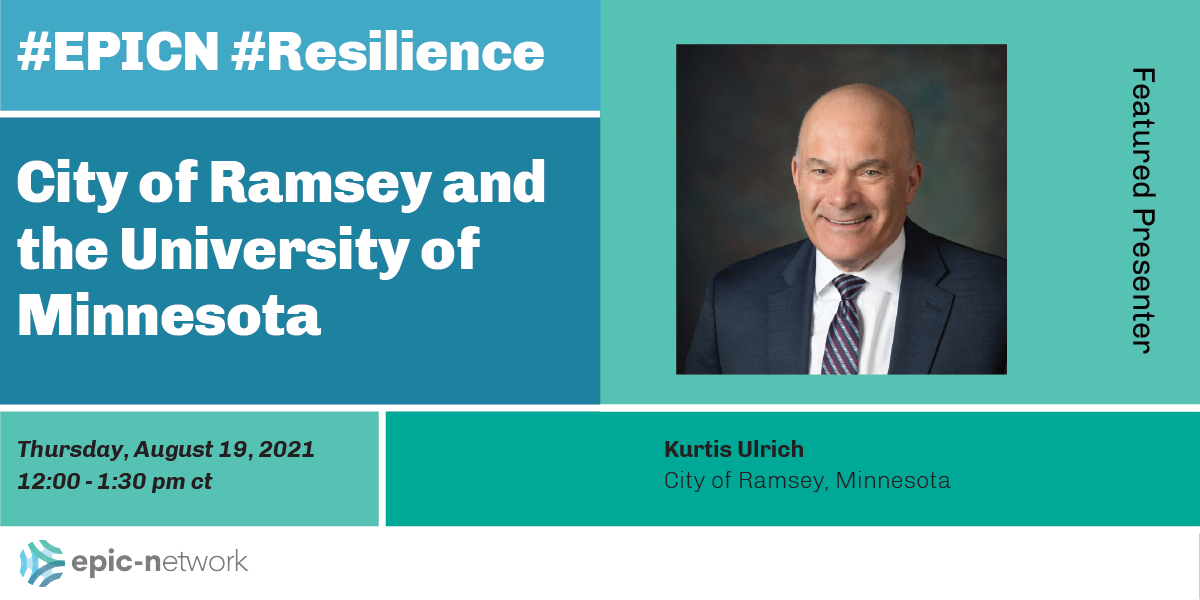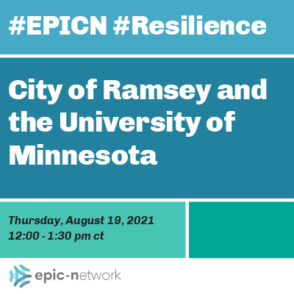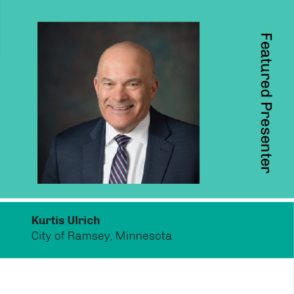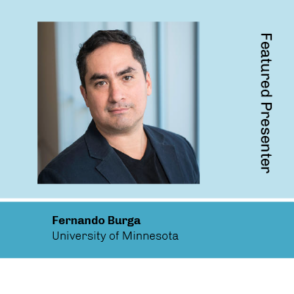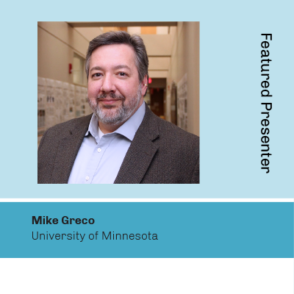Resilience Webinar Series – Partnership Projects, Outcomes, and Impacts on Local Resilience: City of Ramsey and the University of Minnesota
Featured Speakers: Fernando Burga, Mike Greco, and Kurtis Ulrich
Thursday, August 19, 12:00 pm – 1:30 pm CT
In early 2021, we announced a Memorandum of Understanding (MOU) between the U.S. Environmental Protection Agency (EPA), Office of Research and Development (ORD), and the Educational Partnerships for Innovation in Communities Network (EPIC-N). As a part of the MOU, EPIC-N and ORD agreed to host a deep-dive webinar series highlighting examples of local resilience projects completed by EPIC-N programs. The “Resilience Webinar Series – Partnership Projects, Outcomes, and Impacts on Local Resilience” series will begin August 19, 2021 and will run until the end of the year.
The inaugural webinar of the series will feature one of the longest running EPIC-N programs, the University of Minnesota’s Resilient Communities Project (RCP). Joining RCP Co-founder and Director, Mike Greco, will be Assistant Professor, Dr. Fernando Burga, and City of Ramsey, City Administrator, Kurtis Ulrich. They will discuss projects completed during the 2017-2018 academic year, their outcomes, and their own perspectives on how their work together impacted local resilience efforts.
The webinars are free and open to the public.
Webinars in this series will follow this format:
- EPIC-N and US EPA ORD staff will provide a short introduction to the webinar series and introduce the speakers
- EPIC-N staff will moderate the webinar asking speakers about their involvement in the selected projects
- Speakers may share prepared slides, websites, resources, when able
- Following the moderated presentation, those attending the live webinar will be able to engage the panelists in a question and answer session.
Suggested hashtags for social media:
#EPICN #LocalGov #University #Resilience
Following the completion of the webinar, the moderated presentation will be shared on the EPIC-N YouTube channel. The full version of the webinar including the Q&As and the links to any resources shared will be published in the EPIC-N Member Commons for EPIC-N members to use as they desire.
More about the Featured Speakers
H. Fernando Burga is an Assistant Professor at the University of Minnesota with a dual appointment at the Humphrey School of Public Affairs and University of Minnesota Extension. His research, teaching, and service focus on urban planning, particularly the incorporation of immigrant populations into planning, and urban food systems. Fernando has a background in architecture, urban design, and urban planning. Before transitioning into academia, Fernando worked on an array of sustainable urbanism projects. Following his professional tenure, Fernando obtained his doctorate degree in city and regional planning from the University of California, Berkeley. He was a fellow at the Center for Research on Social Change at UC Berkeley and a lecturer at UC Berkeley, San Francisco State University, and San Jose State University. In the San Francisco Bay Area, Fernando conducted qualitative fieldwork with Latino immigrants to assess the application of planning tools in addressing housing, transportation, education, economic development, and nutrition needs. This project won the 2016 American Planning Association Academic Excellence Award for Northern California and subsequently the California State-wide Award.
Mike Greco has more than a decade of experience connecting Minnesota local government agencies with the resources, research, and talent the University of Minnesota has to offer. He has a Master of Urban and Regional Planning degree from the U of MN’s Hubert H. Humphrey School of Public Affairs, with a specialization in environmental planning and sustainability, and a Master of Arts in Communication Studies from the University of North Carolina at Chapel Hill. Mike is a member of the American Institute of Certified Planners (AICP).
Kurtis Ulrich has served as City Administrator for the City of Ramsey, Minnesota, a suburb of Minneapolis (population 27,500) since 2007. During his career, he served as City Administrator in two other Minnesota suburban communities and as the Assistant Commissioner for Administration at the Minnesota Department of Natural Resources. Prior to city administration, he was in the field of urban planning and economic development. He has a Doctorate in Public Administration from Hamline University, a Masters of Business Administration from the University of St. Thomas, a Masters of Arts in Urban and Regional Studies from Minnesota State University, and a Bachelors of Arts in Urban Studies from the University of Minnesota Duluth.
